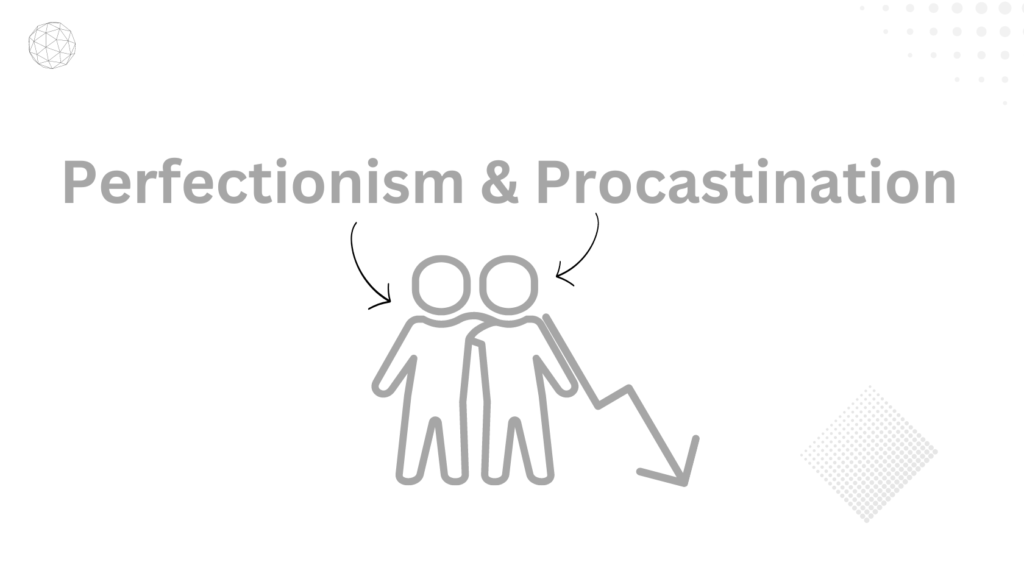Introduction
Perfectionism and procrastination are two sides of the same coin, often leading to stress, anxiety, and unfulfilled potential. Understanding their relationship and learning to overcome them can significantly improve productivity and overall well-being.
What is Perfectionism?
Perfectionism is the relentless pursuit of flawlessness. While striving for excellence is commendable, perfectionism can be paralyzing. It often leads to unrealistic standards, self-criticism, and fear of failure.
Key Characteristics of Perfectionism:
- Setting unattainably high standards
- Overly critical self-evaluation
- Fear of making mistakes
- Procrastination due to fear of failure
What is Procrastination?
Procrastination is the act of delaying tasks despite knowing there will be negative consequences. It is often linked to perfectionism, as the fear of not meeting high standards can cause individuals to avoid starting tasks altogether.
Key Characteristics of Procrastination:
- Delaying tasks unnecessarily
- Avoiding difficult or unpleasant tasks
- Engaging in distracting activities
- Feeling guilty or stressed about delays
The Perfectionism-Procrastination Loop
- Setting Unrealistic Goals: Perfectionists set excessively high standards.
- Fear of Failure: The fear of not meeting these standards leads to anxiety.
- Avoidance: To avoid failure, tasks are postponed.
- Guilt and Stress: Procrastination results in guilt and increased stress.
- Cycle Repeats: The loop continues, further entrenching both behaviors.
Practical Examples
Example 1: Writing a Report
Scenario: A student has a month to write a report but starts only a few days before the deadline.
Perfectionism:
- Set a goal to write the perfect report.
- Spends too much time researching and planning.
Procrastination:
- Delays writing due to fear of not meeting the high standards.
- Engages in other activities to avoid the task.
Result:
- Increased stress and rushed work close to the deadline.
Solution:
- Set Realistic Goals: Break the report into smaller tasks with realistic deadlines.
- Embrace Imperfection: Accept that the first draft doesn’t have to be perfect.
- Use Time Management Techniques: Allocate specific times for research, writing, and editing.
- Reward Progress: Reward yourself for completing each task on time.
Example 2: Launching a Small Business
Scenario: An entrepreneur wants to launch a business but keeps delaying due to fear of failure.
Perfectionism:
- Obsessing over creating the perfect product or service.
- Delaying launch until everything is perfect.
Procrastination:
- Avoids taking the first step due to fear of imperfections.
- Engages in endless revisions and planning.
Result:
- Missed opportunities and delayed progress.
Solution:
- Start Small: Launch a minimum viable product (MVP) and iterate based on feedback.
- Focus on Progress, Not Perfection: Understand that improvements can be made over time.
- Set Milestones: Break the launch process into manageable steps with clear deadlines.
- Seek Support: Surround yourself with supportive individuals who can provide feedback and encouragement.
Strategies to Overcome Perfectionism and Procrastination
1. Set SMART Goals:
- Specific: Clearly define what you want to achieve.
- Measurable: Ensure your goals are quantifiable.
- Achievable: Set realistic and attainable goals.
- Relevant: Ensure goals align with your overall objectives.
- Time-bound: Set deadlines to stay on track.
2. Practice Self-Compassion:
- Be kind to yourself and acknowledge that mistakes are part of the learning process.
- Avoid harsh self-criticism and focus on growth.
3. Use the Pomodoro Technique:
- Work in focused intervals (e.g., 25 minutes) followed by short breaks.
- Helps maintain focus and reduces the tendency to procrastinate.
4. Limit Distractions:
- Identify and eliminate sources of distraction.
- Create a conducive work environment.
5. Seek Accountability:
- Share your goals with a friend or mentor who can hold you accountable.
- Regular check-ins can help keep you on track.
Islamic Perspective:
In Islam, the balance between striving for excellence (Ihsan) and accepting human limitations is emphasized. The Prophet Muhammad (peace be upon him) said:
Hadith:
- “The best of deeds are those done regularly, even if they are few.” (Sahih Bukhari 6464) *
This hadith encourages consistent effort over perfection, highlighting the importance of regular progress rather than seeking unattainable perfection.
Conclusion
Perfectionism and procrastination are common challenges that can hinder progress and cause unnecessary stress. By understanding their interplay and applying practical strategies, you can break free from the perfectionism-procrastination loop, enhance productivity, and achieve your goals with greater ease.




